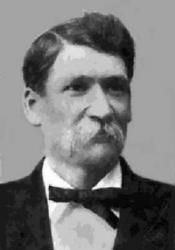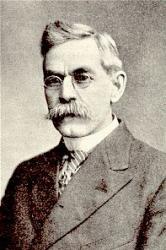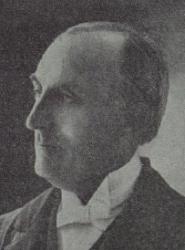Planning worship?
Check out our sister site, ZeteoSearch.org,
for 20+ additional resources related to your search.
- |
User Links
Person Results
I. Baltzell

1832 - 1893 Composer of "[O do not let the word depart]" in Songs of Refreshing Baltzell, Isaiah. (near Frederick, Maryland, November 26, 1832--January 16, 1893, Frederick). He was educated in the common schools, and at New Windsor Academy, Carroll County, Maryland. In 1859 he married Cecilia Caroline James at Mountain Jackson, Virginia. Originally a Lutheran, he joined the United Brethren Church in 1847, was licensed to preach by the Virginia Conference in 1854, and ordained in 1856. In 1862 he joined the Pennsylvania Conference. He was presiding elder from 1875 to 1880, and from 1883 to 1889. He was a delegate to three General Conferences, and was a trustee of Otterbein University. In 1873 he was appointed by the General Conference a member of the committee to superintend the publication of Hymns for the Sanctuary. His first compilation was Revival Songster (Baltimore, 1859). He was joint editor, with G.W.M. Rigor, or Choral Gems (1871); joint editor, with E.S. Lorenz, of Heavenly Carols, Songs of Grace, Gates of Praise, Songs of Cheer, Songs of the Kingdom, Holy Voices, Songs of Refreshing, Notes of Triumph, Garnered Sheaves, Songs of the Morning, and The Master's Praise. He was also author of music and services for special occasions, and the editor and publisher of Carols of Praise.
See: Shuey, W.A. (1892). Manual of the United Brethren Publishing House; Historical and Descriptive: 243-244.
Some of his hymns bear the pseudonym Amicus.
--Harry Eskew, DNAH Archives
I. Baltzell
L. L. Pickett

1859 - 1928 Composer of "[Oh, do not let the word depart]" in Tears and Triumphs Rv Leander Lycurgus Pickett USA 1859-1928. Born at Burnsville, MS, he became a Methodist evangelist. He held meetings in several states and at Holiness campgrounds. After marrying Ludie, they served pastorates in northeast TX, and Columbia, SC, before moving to Wilmore, KY. Pickett married Pruvy Melviney Dorough in 1878, and they had a son, James, in 1880. After her death in 1887, he married Ludie in 1888. He was a renowned speaker, leader, minister, author, hymnwriter, and patriot, prominent in the Holiness Movement, and helped found Asbury College (now University), at Wilmore, KY, where he also served as the financial agent of the board of trustees for many years. The Picketts boarded m,inistry students attending Asbury, among whom was missionary E Stanley Jones. In 1905 a student prayer meeting at the Pickett home spilled out to the Asbury campus in a revival that spread around the town of Wilmore. Between 1891 and 1926 Pickett published 11 song books, some with others, including John Sweney, William J Kirkpatrick, John Bryant, Martin Knapp, Elisha A Hoffman, Burke Culpepper, William Marks, Benjamin Butts, and Robert McNeill. He died at Middlesboro, KY.
John Perry
L. L. Pickett
Eliza Holmes Reed
1794 - 1867 Person Name: Elizabeth H. Reed Author of "Oh, Why Not Tonight?" in Timeless Truths Reed, Eliza, née Holmes, was born in London, March 4, 1794; married to the Rev. Andrew Reed in 1816; and died July 4, 1867. Mrs. Reed entered fully and earnestly into her husband's extensive charitable works. Her publications include Original Tales for Children; and The Mother's Manual for the Training of her Children, 1865. Her hymns, 20 in all, were contributed to her husband's collection, and were republished with his in the Wycliffe Chapel Supplement, 1872. They are only of average merit, and have not attained to a marked position. They include:—
1. Gracious Lord, as Thou hast bidden. Holy Baptism.
2. I would be Thine, 0 take my heart . Dedication of Self to Christ.
3. 0 do not let the word depart. The Accepted Time.
4. 0 that I could for ever dwell. Communion with God Desired.
--John Julian, Dictionary of Hymnology (1907)
Eliza Holmes Reed
Fred A. Fillmore

1856 - 1925 Person Name: Fred. A. Fillmore Composer of "WHY NOT BE SAVED TONIGHT?" in The Praise Hymnal Born: May 15, 1856, Paris, Illinois.
Died: November 15, 1925, Terrace Park, Ohio.
Buried: Milford, Ohio.
Frederick Augustus Fillmore, who was born on May 15, 1856, in Paris, IL, one of seven children, five sons and two daughters, born to Augustus Damon and Hannah Lockwood Fillmore. His father was a preacher in the Christian Church, as well as a composer,
songbook compiler, and hymn publisher who developed his own system of musical notation using numbers on the staff in place of note heads. Augustus eventually settled in Cincinnati, OH, and established a music publishing business there. Until 1906, there was no official distinction between "Christian Churches" and "Churches of Christ." The names were used pretty much interchangeably, and many older churches of Christ which are faithful today were once known as "Christian Churches."
Fred and his older brother James took over their father's publishing business following the death of Augustus in 1870 and established the Fillmore Brothers Music House. This became a successful Cincinnati music form, publishing church hymnals and later band and orchestral music. For many years the firm issued a monthly periodical, The Music Messenger. The brothers edited many hymnbooks and produced many songs which became popular. Beginning with the songbook Songs of Glory in 1874, there appeared many Fillmore publications which became widely used through churches, especially in the midwest. For these collections, Fred provided a great deal of hymn tunes.
--launch.groups.yahoo.com/group/hymnoftheday
Fred A. Fillmore
R. M. McIntosh

1836 - 1889 Composer of "[Oh do not let the word depart]" in Good News Used Pseudonym: Robert M. McIntosh
==========
Rigdon (Robert) McCoy McIntosh USA 1836-1899 Born at Maury County, TN, into a farming family, he attended Jackson College in Columbia, TN, graduating in 1854. He studied music under Asa Everett in Richmond, VA, and became a traveling singing school teacher. He also served briefly in the Civil War. He wrote several hymns during this period of his life. In 1860 he married Sarah McGlasson, and they had a daughter, Loulie Everett. In 1875 he was appointed head of the Vanderbilt University Music Department in Nashville, TN. In 1877 he joined the faculty of Emory College, Oxford, GA. In 1895 he left Emory College to devote his time to the R M McIntosh Publishing Company. He also served as music editor of the Methodist Episcopal Church South Publishing House for over 30 years. His song book publications include: “Good news” (1876), “Light & life” (1881), “Prayer & praise” (1883), “New life” (1879), “New life #2” (1886), and “Songs of service” (1896). He died in Atlanta, GA.
John Perry
R. M. McIntosh
J. Calvin Bushey
1847 - 1929 Composer of "[Oh, do not let the Word depart]" in Timeless Truths James Calvin Bushey USA 1847-1929. Born in Arendtsville, PA, Bushey was a singing teacher who lived in Ohio during the latter 19th century. He compiled several music collections, including “The Chorus Class” (1879), “Sparkling Gems” (1880), “Choral Climax” (1886), and “Magneic Melodies” (1892), all published by the Music firm of Will L. Thompson. Bushey moved to Peoria,IL, late in life and died there.
John Perry
J. Calvin Bushey
F. A. Blackmer
1855 - 1930 Composer of "[Oh, do not let the word depart]" in Gospel in Song Blackmer, Francis Augustus. (Ware, Massachusetts, February 17, 1855--October 8, 1930, Somerville, Massachusetts). Advent Christian musician. His parents, Augustus and Jane Blackmer, were among those caught up in the excitement of the Millerite Movement. One son, Fred, became an Advent Christian minister. Francis, with a talent recognized at an early age, consecrated his own life to Christian service as a musician. He was immersed in baptism at the Adventist campmeeting in Springfield, Massachusetts, by Elder Miles Grant.
His early years were spend in central Massachusetts, his schooling at Wilbraham Academy. He was largely self-taught in harmony and musical composition. He wrote the words and music to his first gospel song, "Out on the fathomless sea," at the age of sixteen. Altogether he wrote over 300 gospel songs about the Second Coming, witnessing and working for the Lord, and praises to God's Holy Name. A few of these have circulated widely outside his own denomination. His final text, "I shall see him, And be like him," came when he was so weak that his friend, Clarence M. Seamans, had to supply the music. He used the pseudonym, A. Francis, with some of his early songs.
Blackmer's first anthology was The Gospel Awakening, (1888). Subsequent gospel songbooks with which he was associated were: Singing by the Way (1895), Carols of Hope (1906), The Golden Sheaf, No. 2 (1916), and Songs of Coming Glory (1926).
Most of his adult life was spent in Somerville, Massachusetts, a suburb of Boston, where he had a prosperous piano business. In the 1890s, his "Francis A. Blackmer Pianos" were made for him by the Washington Hall Piano Company of Boston. Later, his "Good as Gold Pianos" were manufactured by the Christman Piano Company of New York City and shipped directly to his customers throughout New England.
In Somerville, Blackmer served as choirmaster and song-leader in the Advent Christian Church for many years. He was also an elder of the church until his death. From 1914 until his death, he was songleader at the mid-summer Alton Bay Campmeeting on Lake Winnepesaukee, New Hapshire. There his High Rock Hill was both a salesroom and a summer cottage over the years. He was a member of the board of directors of the campmeeting association for several years. Very popular were his singing sessions on the campground square between suppertim and evening services, and a final sing into the small hours of the night following the final service of the campmeeting.
--Leonard Ellinwood, DNAH Archives
F. A. Blackmer
J. H. Rosecrans

1845 - 1926 Composer of "[O do not let the word depart]" in Conquest Hymns James Holmes Rosecrans studied at the Baxter University of Music in Friendship, New York. After teaching for two years, he joined the Fillmore Brothers Music House in Cincinnati, Ohio. As of 1880, he was teaching music in Douglas County, Colorado. In 1884, was an evangelist in California, and later was associated with evangelistic efforts in Texas, and taught music and Bible at Carlton College in Bonham, Texas. He published over 20 music collections in his lifetime.
© The Cyber Hymnal™ (www.hymntime.com/tch)
J. H. Rosecrans


 My Starred Hymns
My Starred Hymns

